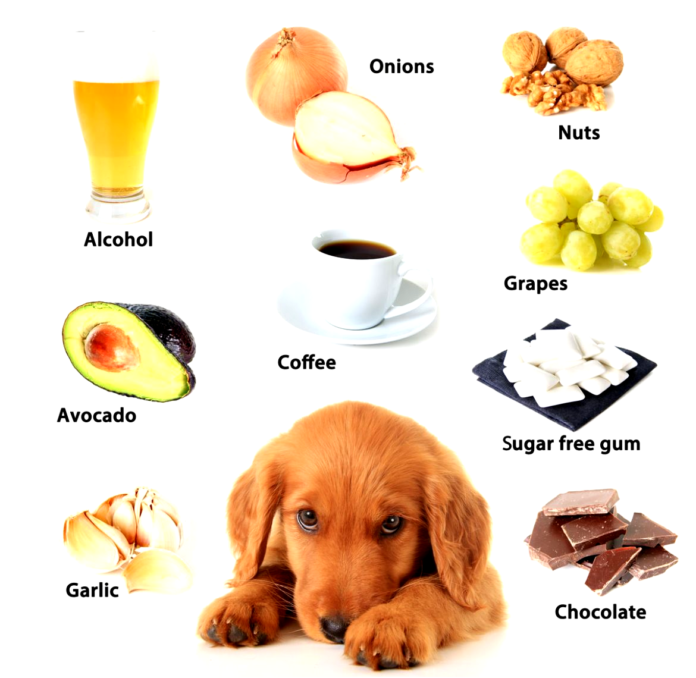Toxic and Dangerous Food You Must Never Give To Your Dog
Babul Rudra Paul1, Bijay Kumar Patra2
1Assistant Professor, Department of Veterinary Clinical Complex, College of Veterinary Sciences and Animal Husbandry, O.U.A.T, Bhubaneswar-751003
2Director, Department of Veterinary Clinical Complex, College of Veterinary Sciences and Animal Husbandry, O.U.A.T, Bhubaneswar-751003
Introduction:
Dogs are beloved family members, so it’s important for us to know which foods can be detrimental to them. Despite their curious nature, dogs lack the ability to discern what’s safe to eat and what isn’t, making them susceptible to ingesting toxic substances. This comprehensive guide aims to educate dog owners about common foods that pose a threat to their pet’s health, highlighting the risks, symptoms of ingestion, and preventive measures.
Chocolate:
Chocolate is one of the most well-known foods that is poisonous to dogs. Caffeine and theobromine, two substances found in chocolate, are poisonous to dogs. The kind and quantity of chocolate consumed determines how poisonous it is. Theobromine concentrations in dark chocolate and cocoa powder are higher than in milk chocolate, making them more dangerous. Chocolate consumption can cause symptoms like diarrhoea, vomiting, tremors, seizures, elevated heart rate, and in extreme situations, death. If your dog has eaten chocolate, it is imperative that you take it to the vet right away.
Grapes and Raisins:
Even tiny amounts of grape and raisin consumption can result in renal failure, even if the precise chemical responsible for the toxicity in dogs is still unknown. Lethargy, decreased appetite, vomiting, diarrhea, and stomach pain are possible symptoms. Timely veterinary attention is necessary to avoid permanent kidney damage. Keep raisins and grapes out of your dog’s reach because even a small amount can be harmful.
Xylitol:
Dogs are severely poisoned by xylitol, a sugar substitute that is frequently present in sugar-free gum, candies, baked products, and some brands of peanut butter. When xylitol is consumed, the body releases insulin quickly, which can result in hypoglycemia (low blood sugar), seizures, liver failure, and even death. Making ensuring that products containing xylitol are kept away from dogs and reading product labels to determine their xylitol level is vital. Should your dog consume xylitol, contact a veterinarian right away.
Onions and Garlic:
Thiosulfates, which are found in onions and garlic, can harm a dog’s red blood cells and cause hemolytic anemia. Toxic effects of onions or garlic can include pale gums, black urine, vomiting, diarrhea, and weakness. In extreme circumstances, organ damage and collapse may result. Any meal that contains onions or garlic, including cooked dishes, should not be given to dogs because even tiny amounts can be dangerous.
Avocado:
While avocados are a nutritious fruit for humans, they contain a fungicidal toxin called persin, which can be harmful to dogs in large quantities. Ingestion of avocado flesh is unlikely to cause serious harm, but the pit and skin pose a choking hazard. Symptoms of avocado toxicity in dogs may include vomiting, diarrhea, and difficulty breathing. Keep avocados out of reach of your dog, and discard any parts they may have access to.
Alcohol:
Alcohol consumption can have severe and potentially fatal consequences for dogs. Even small amounts of alcohol can cause intoxication, leading to symptoms such as vomiting, diarrhea, decreased coordination, difficulty breathing, tremors, coma, and death. Never intentionally give alcohol to your dog, and be mindful of spills or unattended beverages, as dogs may be tempted to investigate and ingest them.
Bones:
Contrary to popular belief, bones, especially cooked bones, can pose serious risks to dogs. Cooked bones are prone to splintering, which can lead to choking, gastrointestinal blockages, or perforations. Raw bones also carry the risk of bacterial contamination, such as Salmonella or E. coli, which can cause severe illness in dogs. Avoid giving dogs bones of any kind, and opt for safe, commercially available chew toys instead.
Raw Meat and Eggs:
Feeding dogs raw meat or eggs can expose them to harmful bacteria, including Salmonella, E. coli, and Listeria. Ingestion of these bacteria can cause food poisoning, resulting in symptoms such as vomiting, diarrhea, fever, and lethargy. Additionally, raw meat diets may lack essential nutrients and increase the risk of nutritional imbalances. It’s safer to feed dogs commercially prepared dog food that meets their dietary needs and undergoes rigorous quality control.
Dairy Products:
While many dogs enjoy the taste of dairy products, such as milk, cheese, and yogurt, most are lactose intolerant to some degree. Lactose intolerance results from a deficiency of lactase, the enzyme needed to digest lactose, the sugar found in dairy. Ingestion of dairy products can cause gastrointestinal upset, including diarrhea, gas, and abdominal discomfort. Limit or avoid feeding dairy products to dogs, especially those with known sensitivities.
Conclusion:
As responsible pet owners, we must prioritize the health and well-being of our canine companions. We can help to keep our pets safe by learning about common poisonous foods for dogs and taking proactive steps to limit access to these substances. Remember to seek veterinarian care right away if you feel your dog has consumed something harmful, since early intervention can dramatically improve their prognosis. With adequate education and awareness, we can create a safe environment in which our dogs can grow and live a long, happy life with us.


